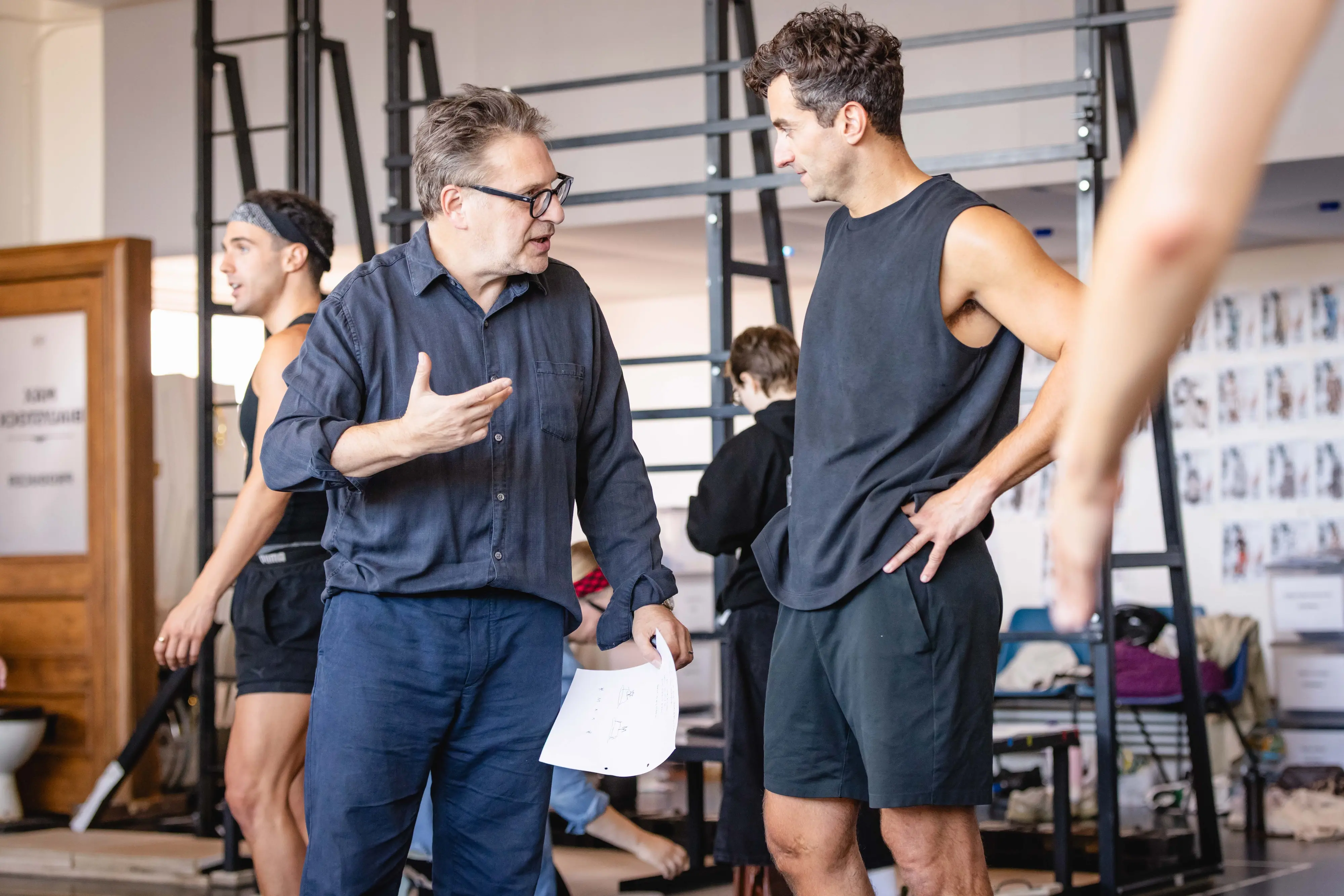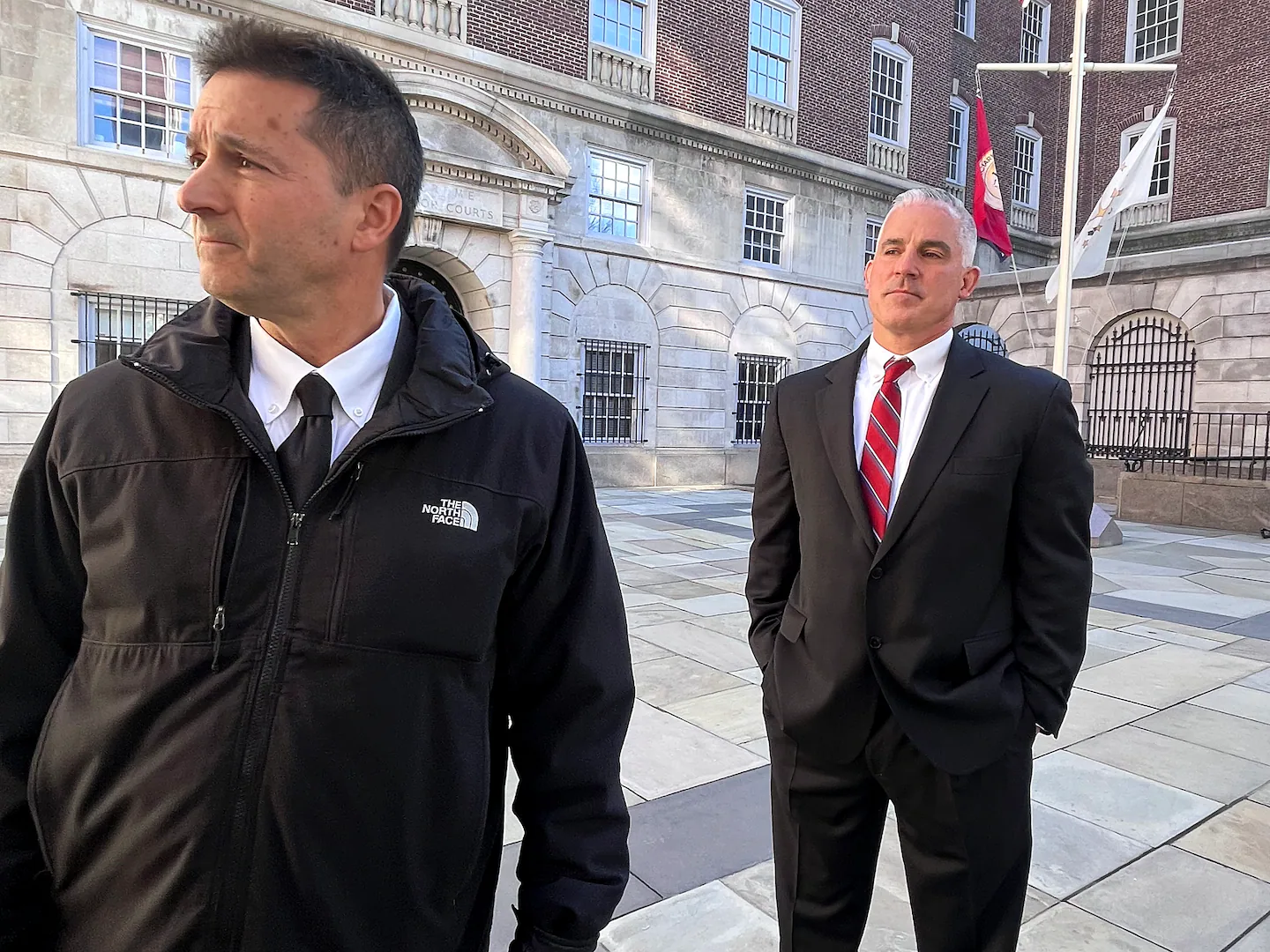By John Nathan
Copyright thejc

It is easy to envy Patrick Marber. It is not very long since the award-winning playwright of the hit, brutal relationship play Closer (1997) won a Tony award for his production of Tom Stoppard’s Leopoldstadt. More recently the Oscar-nominated screenwriter (for Notes on a Scandal) directed a ridiculously starry revival of David Mamet’s Glengarry Glen Ross on Broadway starring Bob Odenkirk, Kieran Culkin and the comedian Bill Burr. And now here he is sitting in an east London rehearsal space characteristically unexcited about life, even though his Menier Chocolate Factory production of Mel Brooks’s The Producers has just transferred to the West End. A musical comedy in which there are more swastikas than tap shoes, it opened in the wake of the Unite the Kingdom march in London and at a time when satirising the far right feels like a very necessary thing to do. More necessary than ever perhaps, though Marber doesn’t quite see it that way. “The film [released in 1967] was 20 years after the end of the war”, he observes. “I think it would have been shocking and dangerous back then. But certainly now, with the rise of the ‘new right’ and actual swastikas in America – less so here, thank God – I didn’t have to do much to make it feel relevant and potent.” Perhaps most envious of all is the air of sangfroid with which he meets the current tide of antisemitism, more of which later, but about which most of the plays he has directed recently have addressed one way or another. Because of this he jokingly describes himself as a “Jew director” to convey the way he is currently viewed by producers. Not that has ever avoided the “Jew” tag. His play Howard Katz (2001) is an explicitly Jewish take on midlife crisis. But it is not a stretch to say that if Tom Stoppard had not been moved to write about the Holocaust after discovering he was Jewish on both sides (a phenomenon described in Leopoldstadt as “the full calamity”), Marber may not have had what can now be called his Jewish period. I wanted to portray Max and Leo as Jews. I wasn’t that bothered if I had Jewish actors or not. I just wanted them to be Jewish characters After Leopoldstadt came the work he describes as “a fabulous play, that I had to do”, Nachtland by German writer Marius von Mayenburg, which imagined the effect on a German family – one of whom is married to a Jew – after they find an original Hitler oil painting is discovered in their father’s attic. That was followed by Nathan Englander’s adaptation of his short story What We Talk About When We Talk About Anne Frank – “I thought ‘I’ve got to do this. it’s wonderful and hilarious,” – a collision of Orthodox Israeli and diaspora secular Jews. The Producers (Photo: Manuel Harlan)[Missing Credit]Leopoldstadt[Missing Credit]Angus Wright, John Heffernan, Dorothea Myer-Bennett in Nachtland (Photo: Ellie Kurttz)[Missing Credit]What We Talk About When We Talk About Anne Frank (Photo: Mark Senior)[Missing Credit] “But that’s how it goes. I mean when I wrote Closer, for the next five years I was offered sexy plays to direct or sexy books to adapt because I had marked out that territory.” This makes sense. Theatre producers choose writers and directors in the way the rest of us choose plumbers and electricians, because that’s what we know they do. So after The Producers – Marber’s first musical – we can expect more Marber-directed musical theatre. In the meantime it is essential for Marber to saturate Brooks’s show with a Jewish sensibility. “I wanted to convincingly portray Max and Leo as Jews. Whether I had Jewish actors or not, I wasn’t that bothered. I just wanted them to be Jewish characters. [This would mean] there would be more fun to be had in their relationship with [the Nazi] Franz Liebkind and their relationship to Springtime [With Hitler], and with the whole vibe of the piece. It seemed to me that’s what Mel wrote, that’s what’s in the film, and that’s what I wanted our show to be.” Today, sitting in east London, Jewishness is tugging yet more at Marber. “I’d have loved to have been able to walk these streets when they were Jewish and feel what that was like,” he says. “But this is a relatively recent thing. I mean, 30 years ago I wouldn’t have been interested. I’ve become more interested as I’ve got older”, adds the 60-year-old which is when our conversation becomes less like an interview and more like a couple of Yidls ruminating over the state of things. What does Marber put this late-onset Jewishness down to, I ask. “Death,” he says without hesitation. “The imminence; the contemplating of. And, well, thinking about where I want to be buried or cremated.” Has he made a decision? “None,” he says, with a note of exasperation, as if having faced a dramatic conundrum while writing a play he has been unable to find the answer. “Probably cremation in Hoop Lane is the easy way out,” he adds, not altogether convinced. Synagogue membership will give you a burial option, I offer, feeling like a rabbi trying to sign him up. “I know. I’m not a member. And that’s another thing I’m thinking about. I think I want to join a synagogue. I like the look of the one in Sandys Row, the Huegenot one round the corner. It’s tiny.’ We contemplate other synagogal options, and from there how the mood towards Jews in the country has become more hostile, about which he can’t help but be funny. “I think people have a right to hate Jews,” he says with a glint. I sometimes hate them. We’re really good at it, and funny about it. It’s one of the glories of our culture. “I don’t think any other culture abuses itself as much as the Jews do. Name another faith, religion or culture that is as self-mocking as us.” I tell him the one about the rabbi who says an antisemite is someone who hates Jews more than absolutely necessary, and when the chuckles die down he says, “I mean, that’s our thing. “I love that being our thing, which is why I can’t get all angry about non Jews [actors] playing Jews. I want us to be the liberal culture that looks outwards, and not ring-fencing itself in, which is also why there are things happening in Gaza and the West Bank that horrify me. I think, ‘That’s not us. That’s not what we’re supposed to be,’ which is what Nathan Englander’s play was saying. ‘These are not Jewish values.’” I grew up in a culture that wasn’t fully supportive of Jews. I belong to an ethnic minority. I accept the blows that occur He is more sanguine about antisemitism. “I grew up [in Wimbledon] feeling the hatred and in a culture that wasn’t fully supportive of Jews. I belong to an ethnic minority. So be it. I accept the blows that occur and the abuse.” Consequently he doesn’t feel like a “full and proper Englishman” or that he has “a divine right to live here.” Home is where his wife and children are, he says. So Bloomsbury. Meanwhile his three sons [by his non Jewish actress wife Debra Gillett] who are 19, 21 and 23 feel themselves to be increasingly Jewish because every now and then “someone calls them a Jew in the street because they look a bit Jewish.” I say that I’m dreading this happening to my 12-year-old daughter. “It’s not the worst thing that can happen,’ he says reassuringly. “To experience the hate of strangers,’ he continues, inverting the Tennessee Williams line, “is not the worst thing in the world. The worst thing is to be beaten up by them. But someone going “Jew!”? Well, you are!” The Producers is at The Garrick Theatre



